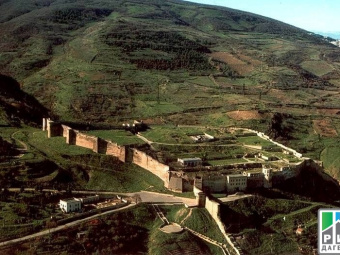Популярное
- Dagestani team of chefs wins culinary competition in Istanbul
- Dagestan introduces forest patrols and special fire-prevention regime
- Makhachkala to host festival of cross-national musical culture "Consonance of Victory"
- Dagestan to host international Forum on sustainable mountain area development with focus on tourism and economy
- Two large football complexes to be opened in Dagestan
- Advancement of Islamic finance discussed at St. Petersburg International Economic Forum 2025
- Makhachkala hosts first multi-brand exhibition of construction tools BISMAR EXPO 2025
- Dagestan and Omsk region sign multilateral cooperation agreement
- Dagestani Youth Affairs Ministry and Clover company agree to cooperate
- Dagestan becomes one of winners in "Native" All-Russian award
Derbent – gates to Orient - Djamilya Gazieva
Djamilya Gazieva, Senior specialist of branch of the Foreign Affairs Ministry in Dagestan
|
|
7168
2 минуты
No doubt, the overhaul and large-scale restoration work initiated by Dagestani Head will remain in Derbent history as a tribute to the memory of those who founded the city, built the magnificent fortress and defended its independence fr om invaders. The descendants would be grateful to those who did not surrender the magnificent city and to those who tried to restore it in such difficult financial circumstances.
The historians confirm the 5,000-year-old first settlements on the territory of Derbent and the 200-year-old status of Derbent as an urban settlement. Therefore, the 2000 anniversary of one of the oldest cities in Russia will be celebrated on September 19.
The city is located in the eastern part of the Caucasus wh ere the mountain is closest to the Caspian Sea, leaving only a narrow strip of plain. Having completed the plain, the city formed a so-called Derbent or Caspian passage.
The role of Derbent and the Derbent passage in the ancient times was so great, because it was located in one of the most strategically important places. Here, the most convenient route from southeastern Europe to Persia and Western Asia run, and the isthmus was basically a military point that caused the confrontation between states.
Medieval Derbent was the largest port on the Caspian Sea, the most important center of international transit trade in the East - West, North and South. The city maintained close trade ties with many regions and cities of the Middle East and Eastern Europe. Medieval authors and numerous archaeological finds confirm this fact.
Arab conquerors had a great influence on the formation of Derbent as the largest political and economic center in the Caucasus and one of the cultural centers of the Muslim world. It is no accident that the famous Arab commander Maslamah bin Abdul-Malik is called "second father" of Derbent for his significant contribution to the city development.
Источники










